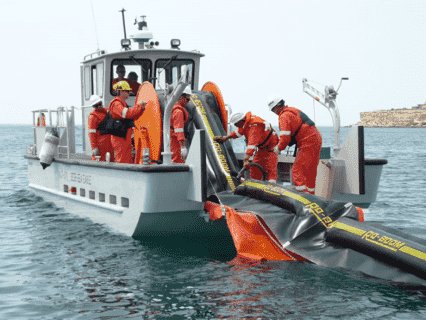COURSE OVERVIEW
SAFETY, HEALTH & ENVIRONMENTAL ENGINEERING & MANAGEMENT

OVERVIEW
| COURSE TITLE | : | HE0632 : Certified HAZID Leader: Hazard Identification, Analysis and Risk-Based Decisions |
| COURSE DATE | : | Mar 04 - Mar 08 2024 |
| DURATION | : | 5 Days |
| INSTRUCTOR | : | Mr. Peter Christian Days |
| VENUE | : | Abu Dhabi, UAE |
| COURSE FEE | : | $ 5500 |
| Request For Course Outline | ||
OTHER SCHEDULED DATES
| Date | : | Jun 02 - Jun 06 (5 Days) | Location | : | Al Khobar, KSA | Classroom Fee (US$) | : | $ 5500 | Course Info |
| Date | : | Sep 01 - Sep 05 (5 Days) | Location | : | Doha, Qatar | Classroom Fee (US$) | : | $ 6000 | Course Info |
Course Description
This practical and highly-interactive course includes various practical sessions and exercises. Theory learnt will be applied using our state-of-the-art simulators. A Hazard identification (HAZID) study is the method of identifying hazards to prevent and reduce any adverse impact that could cause injury to personnel, damage or loss of property, environment and production, or become a liability. HAZID is a component of risk assessment and management. It is used to determine the adverse effects of exposure to hazards and plan necessary actions to mitigate such risks. HAZID study takes into account all of the process and nonprocess hazards. It helps to design and organize the health, safety and environmental issues in an organization. HAZID involves machine or equipment designers, management and end users, and ensures a full identification of hazards and safeguard procedures in a workplace. This course is designed to provide participants with a detailed and up-to-date overview of hazard identification, analysis and risk-based decisions. It covers the hazard and risk, accident model, physical and process hazards, the benefits of hazards identification and hazards types by industry; and the hazards through concept of recognition, basic human senses, relationship between senses and higher order processes and what causes hazards. By the end of the course, participants will be able to recognize the influence of human capabilities and limitations on hazard identification by applying visual detection, sound detection, odor detection, touch detection and hazard recognition; determine explosion hazards, chemical hazards, electrical hazards, weather phenomena hazards and other types of hazards; evaluate hazards covering field surveys, pre-job assessments, facility assessments, incident and near-miss reporting, hazard identification and analysis training; carryout HAZID study, HAZID process, HAZID recording and raising effective corrective actions; implement other hazard identification techniques, HAZOP, failure modes and effects analysis (FMEA), plant walkdowns/audits, what if analysis and task analysis/job hazard analysis (JHA); employ risk-based decisions and risk ranking procedure; follow-up and call to action; and recognize the importance of managing change, published accident databases and resources, revitalized lessons learned, transfer knowledge and learn from incidents link to course overview PDF
TRAINING METHODOLOGY
This interactive training course includes the following training methodologies as a percentage of the total tuition hours
LecturesWorkshops & Work Presentations
Case Studies & Practical Exercises
Videos, Software & Simulators
In an unlikely event, the course instructor may modify the above training methodology before or during the course for technical reasons.
VIRTUAL TRAINING (IF APPLICABLE)
If this course is delivered online as a Virtual Training, the following limitations will be applicable
| Certificates | : | Only soft copy certificates will be issued to participants through Haward’s Portal. This includes Wallet Card Certificates if applicable |
| Training Materials | : | Only soft copy Training Materials (PDF format) will be issued to participant through the Virtual Training Platform |
| Training Methodology | : | 80% of the program will be theory and 20% will be practical sessions, exercises, case studies, simulators or videos |
| Training Program | : | The training will be for 4 hours per day starting at 09:30 and ending at 13:30 |
| H-STK Smart Training Kit | : | Not Applicable |
| Hands-on Practical Workshops | : | Not Applicable |
| Site Visit | : | Not Applicable |
| Simulators | : | Only software simulators will be used in the virtual courses. Hardware simulators are not applicable and will not be used in Virtual Training |
RELATED COURSES

HE0793 : Oil Spill Management & Response (IMO OPRC Level 1 & 3)
- Date : May 12 -May 16 / 3 Days
- Location : Al Khobar, KSA
- Course Details Register

HE1865 : Hazard and Effects Management Process (HEMP)
- Date : May 20 -May 23 / 3 Days
- Location : Al Khobar, KSA
- Course Details Register

HE0913 : Certified Occupational Health, Safety & Industrial Hygiene
- Date : May 19 -May 23 / 3 Days
- Location : Al Khobar, KSA
- Course Details Register

HE1714 : NEBOSH Certificate in Health & Safety Leadership Excellence
- Date : May 09 -May 09 / 3 Days
- Location : Dubai, UAE
- Course Details Register
